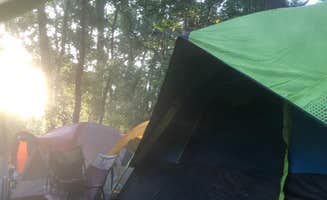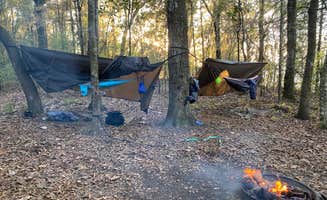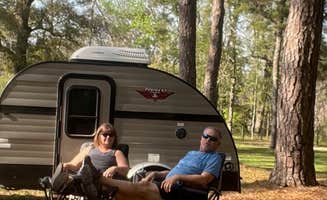Tent camping near Bristol, Florida provides diverse backcountry experiences in Apalachicola National Forest's varied terrain. The area features several primitive hunt camps and forest service campgrounds with opportunities to explore both riverfront sites and inland lake locations. Winter and spring offer comfortable temperatures for camping, while summer brings high humidity and increased insect activity.
What to do
Fishing access: Cotton Landing offers direct shoreline fishing with minimal competition from other anglers. "Loved my stay at this location... people I met there were great, no drama and bathrooms were decent," reports Katlyn A., who recommends collecting firewood along the dirt road coming in to avoid ticks in the wooded areas.
Hiking trails: Fort Braden Tract Primitive Campsites features three loop trails with modest elevation changes. "Nice elevation changes, refreshing for Florida hiking. There was a group site in between that was very nice and we were told was often used by youth groups," notes Jeanene A., who appreciated the quiet setting.
Wildlife viewing: Camp sites near the water provide opportunities for wildlife observation, particularly bird watching and reptile spotting. "We even got a visit from your friendly neighborhood alligator in the middle of the night, which when I realized after the fact what the sound was was terrifying," shares Edward W. from Fort Braden Tract, noting the steep bank provided some security from wildlife encounters.
What campers like
Budget-friendly options: Whitehead Landing NF Campground provides exceptional value at $3 per night with basic amenities. John P. mentions, "Decent Verizon signal, no T-Mobile. Non-potable water spigot. There's a nice little boat ramp on the river."
Uncrowded camping: Many campers appreciate the solitude available at these sites even during peak seasons. "Spacious and quiet camping area. Camped here for a weekend in mid-February and there was only one other person here, despite the free campground just down the road being full," reports one camper at Whitehead Landing.
Water access: White Oak Landing Campground provides convenient boat access with river frontage. "This site is just off hwy 65. It has open areas for more room to spread out, picnic tables and restrooms. This site also has an everflowing water supply that has been there for decades," states Jacob A., noting that while the water contains sulfur, it's clean and cold.
What you should know
Water availability: Bring drinking water to most sites, as available water may not be potable. At Hall Landing, one camper noted, "Water spigots at each site, but we filled up our jug with it and dumped it back out, water had a brownish tinge."
Tick prevention: Several campsites report tick issues, especially during warmer months. Avoid gathering firewood from wooded areas to reduce exposure. One camper at Cotton Landing advises staying on established paths and avoiding "sticker bushes" which harbor ticks.
Cellular coverage: Camp Mack and several other sites have limited cell service. "Small campground in National Forest. 10 sites. Very quiet. We felt very safe," reports a camper, mentioning the area is popular with hunters, which affects seasonal crowding patterns.
Campground cleanliness: Facilities vary widely between sites. At many hunt camps, fire rings often contain trash from previous campers despite nearby receptacles, requiring some cleanup before use.
Tips for camping with families
Unique experiences: Goat House Farm offers a distinctive camping experience with animals. "We had such a fun time camping at the goat farm. Where you literally camp with goats. The male goats hang out right beside you and your tents," shares Abby, warning to "keep your tents closed or they will sleep with you too."
Safety considerations: Sites near water require vigilance with children. The steep banks at some lake sites provide some buffer from wildlife but represent their own hazard for young campers.
Group site options: Several campgrounds offer designated group areas ideal for family gatherings. Fort Braden Tract includes a centralized group site that accommodates larger family units between its two waterfront sites.
Tips from RVers
Site accessibility: Most hunt camps and primitive sites have limited RV access. Hall Landing Campground accommodates some smaller RVs despite being primarily tent-focused. "This campground is for tents only, however, due to a mix up with our reservation at Walker Landing, they moved us to this campground even though we are in an RV. Most sites are big and level enough for an RV," reports Laura M.
Solar considerations: Sites under heavy tree cover present challenges for solar power. "Lots of tree cover so our solar panels were struggling to get enough sun," notes one RVer at Hall Landing, suggesting positioning rigs strategically in the few clearings available.
Dump station access: No on-site dump stations exist at most tent camping areas near Bristol, but county parks may offer alternatives. According to Laura M., "the county operator said we were welcome to use the dump station at Coe Landing since we were Leon County Parks guests."




